

Moment of Impact. On a midwinter night two years ago, Beatrice* saw a skull appear in the pattern of her bedroom curtain.
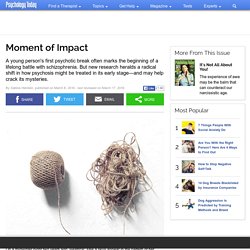
A thick layer of snow blanketed the Long Island town where she lived with her parents and younger sister, Stephanie*. Everyone else in the house was asleep. The skull was silent, but Beatrice knew what its presence meant. She laced up her boots. It was time to run. A 22-year-old college junior majoring in English literature, Beatrice had barely left her room in two weeks. Stephanie—only 18 months younger and as close as a twin to Beatrice—desperately tried to understand what was going on with her sister. Her family became distraught over her behavior, which seemed not only bizarre but entirely out of character.
Beatrice's parents became convinced that she was suffering from some kind of spiritual illness. Then Beatrice saw the skull. Down The Rabbit Hole. How schizophrenia changed the whole course of my life - BBC News. Alice Evans was at university when she developed schizophrenia.
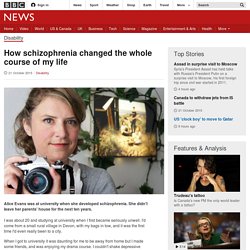
She didn't leave her parents' house for the next ten years. I was about 20 and studying at university when I first became seriously unwell. I'd come from a small rural village in Devon, with my bags in tow, and it was the first time I'd even really been to a city. When I got to university it was daunting for me to be away from home but I made some friends, and was enjoying my drama course. I couldn't shake depressive thoughts I'd had during my teenage years though.
I was working three jobs to make my rent and on top of my degree it proved to be too much. Eventually I stopped sleeping entirely and that was when the problems really started. 11 Pivotal Pros and Cons of Media Censorship. The limits that have been placed in this world, as far as are placed boundaries that have always been in place on the world, as far as media, communication and entertainment are concerned, are slowly lifting away.

We now have the freedom to believe, think and say what we want. However, don’t you think there are some things that should be left unsaid? This is where the question about media censorship comes in; it is when things that are allowed to be published, televised or broadcasted are monitored by the government. This is done for various reasons, including the prevention of negative propaganda to spread.
Though it is said to be implemented for good reasons, there are still many people saying contradicting opinions. PSYA4 - Schizophrenia. 6) Psychological explanations of Schizophrenia. There are two explanations which can be placed under the umbrella term of ‘psychological explanations’, the psychodynamic and cognitive approaches.
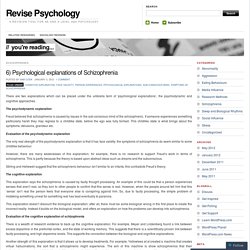
The psychodynamic explanation Freud believed that schizophrenia is caused by issues in the sub-conscious mind of the schizophrenic. If someone experiences something particularly harsh they may regress to a childlike state, before the ego was fully formed. This childlike state is what brings about the symptoms; delusions, grandeur etc. Cognitive Explanations for Schizophrenia by Zoe Alford on Prezi. 6) Psychological explanations of Schizophrenia. A-level Psychology Psychopathology Revision - Explanations of Schizophrenia. No single cause has been identified, biological, behavioural and social research suggests a complex interplay between factors.

For example, people might have an inherited tendency towards schizophrenia that is triggered by environmental circumstances. Family history studies show that schizophrenia tends to run in families. The rate of schizophrenia in the general population is about 1%, but estimates vary. Studies using twins show that in identical (monozygotic or MZ) twins, if one has schizophrenia, the other has 40-50% chance of developing the illness. Behavioural-explanations-of-schizophrenia.
Causes. Nobody knows exactly what causes schizophrenia, and it is likely to be the result of several factors.
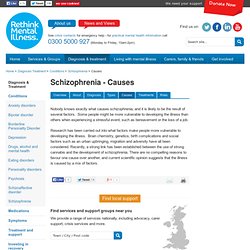
Some people might be more vulnerable to developing the illness than others when experiencing a stressful event, such as bereavement or the loss of a job. Research has been carried out into what factors make people more vulnerable to developing the illness. Brain chemistry, genetics, birth complications and social factors such as an urban upbringing, migration and adversity have all been considered. Clinical subtypes of schizophrenia: differences in brain and CSF volume. OBJECTIVE: Investigations of the relation of clinical features of schizophrenia to neuroanatomic measures have produced inconclusive results.
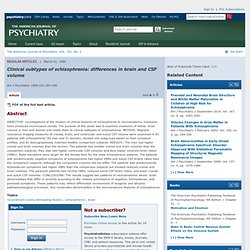
The purpose of this study was to examine measures of whole- brain volume in men and women and relate them to clinical subtypes of schizophrenia. METHOD: Magnetic resonance imaging measures of cranial, brain, and ventricular and sulcal CSF volume were examined in 81 patients with schizophrenia (50 men and 31 women), divided into subgroups based on their symptom profiles, and 81 demographically matched healthy comparison subjects.
RESULTS: The men had higher cranial and brain volumes than the women. Schizophrenia. What is schizophrenia?
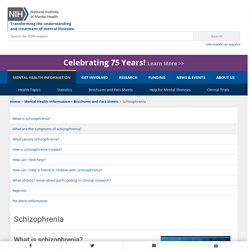
Schizophrenia is a chronic, severe, and disabling brain disorder that has affected people throughout history. About 1 percent of Americans have this illness.1 People with the disorder may hear voices other people don't hear. They may believe other people are reading their minds, controlling their thoughts, or plotting to harm them. Schizophrenia: Symptoms, Diagnosis, Treatment, and Views About Schizophrenia - Roanoke Nonverbal Communication. It is estimated that one in 100 persons will develop schizophrenia at some point in their lives, of which, 2 ½ million schizophrenic persons live in the United States.
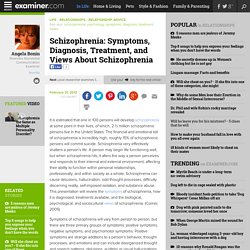
The financial and emotional toll of schizophrenia is incredibly high; roughly 15% of schizophrenic persons will commit suicide. Schizophrenia very effectively shatters a person's life. A person may begin life functioning well, but when schizophrenia hits, it alters the way a person perceives and responds to their internal and external environment, affecting their ability to function within personal relationships, professionally, and within society as a whole. Schizophrenia can cause delusions, hallucination, odd thought processes, difficulty discerning reality, self-imposed isolation, and substance abuse. The Diagnostic and Statistical Manual (DSM) Question: What Is the Diagnostic and Statistical Manual (DSM)?
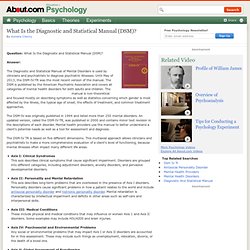
Answer: The Diagnostic and Statistical Manual of Mental Disorders is used by clinicians and psychiatrists to diagnose psychiatric illnesses. Until May of 2013, the DSM-IV-TR was the most recent version of the manual. Schizophrenia Slideshow: How Schizophrenia Affects Thoughts, Behavior, and More. What Is Schizophrenia? Schizophrenia is a chronic, disabling brain disorder that affects about 1% of Americans. It may cause people to hear voices, see imaginary sights, or believe other people are controlling their thoughts. These sensations can be frightening and often lead to erratic behavior. There is no cure, but treatment can usually control the most serious symptoms. A2_AQB_abnormal_schizophreniaPsyBehActivity.pdf.
How cannabis can trigger schizophrenia. By JAMES CHAPMAN, Daily Mail Smoking cannabis affects brain chemistry so seriously it can trigger schizophrenia, scientists warn today. Researchers have found the first evidence that marijuana can cause genetic abnormalities associated with the mental illness, which affects about one in every 100 people. Many scientists have been warning for years that cannabis can trigger hallucinations and delusions similar to symptoms found in schizophrenia. Previous studies have suggested that using the drug before the age of 18 raises the risk of the condition in later life by six-fold. Its ability to cause psychotic conditions is probably related to long-term changes in the brain caused by a substance found in marijuana called tetrahydrocannabinol (THC). THC affects chemicals in the brain that transmit information from one nerve cell to another. Disrupting the delicate chemical balance can result in memory loss, anxiety and other conditions.
PsycNET - Display Record. News analysis: DSM-5 controversial new mental health guide. Thursday August 15 2013 The DSM has been dubbed the ‘Bible of Psychiatry’ “Doctors in dispute: What exactly is normal human behaviour?” , wrote The Independent, while The Observer said: “Psychiatrists under fire in mental health battle.” These headlines focused on a new version of a major guide to mental health that was published in May 2013 amid a storm of controversy and bitter criticism. Fourteen years in the writing (and according to one psychiatrist, “thick enough to stop a bullet”) the fifth edition of the American Psychiatric Association's “Diagnostic and Statistical Manual of Mental Disorders” (DSM-5) has been dubbed “The Psychiatrist’s Bible”. DSM-5 is an attempt to provide doctors with a much-needed definitive list of all recognised mental health conditions, including their symptoms.
Schizophrenia treatment. Psychosocial Treatments for Schizophrenia. Antipsychotic drugs have proven to be crucial in relieving the psychotic symptoms of schizophrenia — hallucinations, delusions, and incoherence — but are not consistent in relieving the behavioral symptoms of the disorder. Even when patients with schizophrenia are relatively free of psychotic symptoms, many still have extraordinary difficulty with communication, motivation, self-care, and establishing and maintaining relationships with others. Moreover, because patients with schizophrenia frequently become ill during the critical career-forming years of life (ages 18 to 35), they are less likely to complete the training required for skilled work. Schizophrenia - Treatment. People who have serious psychotic symptoms as a result of an acute schizophrenic episode may require a more intensive level of care than a CMHT can provide.
Schizophrenia. Schizophrenia. Ashbourne College's Psychology Blog. Biological & Psychological Explanations of Schizophrenia. Schizophrenia is a chronic mental health condition that can cause a range of psychological symptoms which include hallucinations and delusions. A delusion is something which a person believes to be true yet is untrue and a hallucination is hearing or seeing something that is not there or doesn’t exist.
These are psychotic symptoms, with psychosis being the inability for a person to distinguish between reality and imagination. Schizophrenia. Rethinking schizophrenia: Taming demons without drugs - health - 06 February 2014. Antipsychotic drugs may do more harm than good. The tide is turning towards gentler methods, from talking therapies to brain training "I WAS trembling all the time. I couldn't shave. What is it? Schizophrenia is a chronic, severe, and disabling brain disease. Approximately 1 percent of the population develops schizophrenia during their lifetime – more than 2 million Americans suffer from the illness in a given year.
Although schizophrenia affects men and women with equal frequency, the disorder often appears earlier in men, usually in the late teens or early twenties, than in women, who are generally affected in the twenties to early thirties. People with schizophrenia often suffer terrifying symptoms such as hearing internal voices not heard by others, or believing that other people are reading their minds, controlling their thoughts, or plotting to harm them.
Schizophrenia: Tests and diagnosis. Diagnostic Criteria for Schizophrenia. Drugs to Treat Schizophrenia. Why do I need to register or sign in for WebMD to save? Attachment. Schizophrenia: Explanations and Treatments. Psychological explanations of schizophrenia.